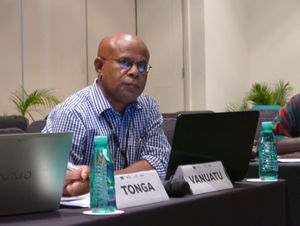Posted: Thursday, July 2, 2015 12:00 am By Thompson Marango, Nadi, Fiji

Ministry of Agriculture, Livestock, Forestry, Fisheries, and Biosecurity (MALFFB), Director General Howard Aru during the Pacific Agriculture Policy Project Meeting in Nadi, Fiji, during the Pacific Community Agritourism Week
Agriculture and Tourism are two of Vanuatu’s biggest sectors but the whole new concept of Agritourism is almost non-existent.
While regional and international partner organisations are pushing forward the new concept, and encouraging Pacific Island Countries to adopt, Vanuatu’s Director General of the Ministry of Agriculture, Howard Aru, said he is excited and convinced that Vanuatu can and will make it happen.
Mr Aru who is also attending the first ever Pacific Community Agritourism Week in Nadi Fiji this week is also a member of the Steering Committee of the Pacific Agriculture Policy Project which is funded by the European Union.
Here he explains the Agritourism concept in our local context, how Agriculture and Tourism can form a linkage and how the ministry under his directorate is planning to play its part to implement the new concept.
Q: What is Vanuatu’s main expectation from this event?
A. My expectation is we are here to learn from an event which is both regional and international because we have our colleagues from the Caribbean and other regions are here with us as in this first ever Agritourism Week in the Pacific. There is a lot happening in Denarau this week but our expectations are very clear, Vanuatu has to make connections and linkages between Agriculture and Tourism, thus the name Agritourism.
What am interested in taking back to Vanuatu is basically experiences from this region and other regions such as the Caribbean to help Vanuatu make that connection.
Q. What are the existing connections between Agriculture and Tourism in Vanuatu?
A. For far too long the two sectors have worked independently but when it comes to tourism, the tourism sector uses agricultural products to provide food to tourists, be it vegetables, fruits, whatever.
And it is very important for the Ministry of Trade and Ministry of Agriculture to work jointly together in terms of strategies and policies to push Agritourism to make sure that we can benefit from what is happening from what is happening in the region and across the ACP and the world.
Q. This concept of Agritourism, why is it not considered and practiced in the past until now?
A. Why it has not happened a long time ago, it could be that the realization of the need for connectivity has not been matured that well say ten years ago or even five years ago. But that realization has come very, very clearly and prominently in the last two years.
For example me and our former Minister of Agriculture, visited Surinam in South America to participate and observe the organization and the statue of the 13th Caribbean Week of Agriculture, and that week was packed with all sorts of events, minister’s meetings, officials’ meeting and so on.
The former minister was very convinced and we’ve pushed forward to make sure that Vanuatu hops on the train that the Pacific region is moving, which is why am here this week with all the delegates from Vanuatu and the region to attend the first ever Agritourism Week.
Q. Taking into consideration that Agritourism is a new concept how is the Ministry of Agriculture planning to promote and implement the idea.
A. Quite a number of things needs to be done in Vanuatu, firstly we need to make a lot of noises, simply means getting them aware, feeding information to them, helping them understand the importance of the consistency of supply to hotels which is a huge challenge for us in Vanuatu.
Q. Majority of Vanuatu farmers are small holders and not so business-minded in terms of logistics, packaging to meet hoteliers’ requirements. How are we going to get them to participate?
A. We need to effectively sent information to and from them. During a meeting last week that we had with the ambassador for Vanuatu to the EU, a rep of CTA, and Digicel rep in Port Vila to look at possibilities to push ICT in Agriculture in Vanuatu, and that is not a dream but something that we will make sure that it happens.
We are going to work with lead farmers across the country, to get those lead farmers connect to our other farmers.
These lead farmers will then work with private sector people whom some are already here in Nadi for this event.
Q. Can you explain what you mean by ICT in Agriculture?
A. ICT in Agriculture basically mean we promote news, we promote products, promote market information, and prices through ICTs.
Now in Vanuatu it is no longer the case that we have 10 years ago or less, for instance we have one of the best ICT networks in the Pacific because of the submarine cable and that is public information, the public know that.
The infrastructure is there, the basic elements are there, so we just have to use it, so one approach is to use it in agriculture. Basically we just have to use the facilities of ICT to communicate information, information is very important. At a symposium in Vila last week a question was raised by a participant, that how can farmers in the remote areas participate?
My answer is we will go with ICT, we have the elements there, we have the structure there, we just have to use it. We are very convinced that if the Meteorological Department can do it with text messages after cyclone Pam when it comes to cyclones we can also do it.
Of course we have done that we did the food push, test messages were send out informing people on what type of crop they need to plant. That’s using ICT in Agriculture. The government is very aware that we can’t put out a hundred agriculture worker in the field any more like we use to do before in the 80s. So we have to use ICTs since mobile technologies is in the hands of a lot of people already.
There is a lot of work to be done but we are convince and excited and we are going to make it happen.





